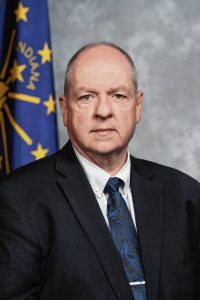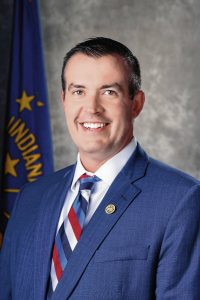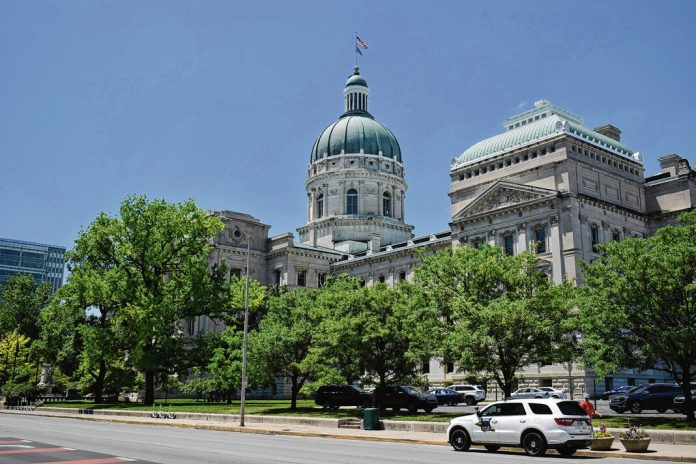The 2024 session of the Indiana General Assembly is now at its halfway point.
What started out with roughly 1,750 bills has been whittled down to about 220 or so as key deadlines have passed. This includes bills authored by Johnson County lawmakers.
Lawmakers in the House of Representatives and the Senate finished moving bills through their respective chambers last week, meaning any bill that did not pass is effectively dead. However, their subjects could live on through similar bills filed by other lawmakers. Language from the dead bills could also be inserted into bills pending before lawmakers during the second half of the legislative session, which starts this week.
Here’s a look at how some legislation by local lawmakers fared.
ALIVE: School safety
House Bill 1104 would change Indiana law to allow school police officers the option to be on a 1977 pension plan, which gives death and disability benefits. It would also allow school corporations or charter schools that have eligible employees, whether that be school resource officers, or personnel from an outside agency, to be eligible for the fund.

It also would make armed intruder drills at schools safer and more efficient. Her bill proposes that if a drill includes sensory components, schools would be prohibited from requiring student participation or holding it during regular school hours.
The bill is authored by State Rep. Michelle Davis, R-Whiteland. She crafted the bill after conversations with the Clark-Pleasant and Center Grove Police Departments, both of which are tasked with protecting their respective school districts, and Sandy Hook Promise, a nonprofit formed after the 2012 school shooting that works in gun violence prevention programs and policy making.
HB 1104 passed the House in a 96-0 vote, with three members excused and one not voting, on Jan. 30. It has been referred to the Senate Education and Career Development Committee, where it awaits a hearing.
ALIVE: Age verification for material harmful to minors
Although Davis’ bill on this topic didn’t get a hearing the issue is still alive at the Statehouse.
Davis’, HB 1036 would have required adult-oriented websites with adult content, like pornography or other “material harmful to minors,” to use a “reasonable age verification method” to prevent minors from accessing their websites. Her bill failed to get a committee hearing. However, two similar bills were proposed this session, HB 1296 and Senate Bill 17.
Like Davis’ bill, HB 1296 failed to get a hearing, but SB 17 did. It passed out of committee on Jan. 10, and later passed out of the Senate in a 44-1 vote, with five excused, on Jan. 19. It awaits a hearing before the House Judiciary Committee.
The American Civil Liberties Union expressed concerns about SB 17 earlier in the session, saying it could subject Hoosiers to harmful surveillance and put their private information at risk, the Indiana Capital Chronicle reported.

ALIVE: Medicaid behavior analysis services report
HB 1156 would require the Office of the Secretary of Family and Social Services to prepare and submit a report to certain entities on the effects of Medicaid reimbursement changes to the applied behavior analysis services. This report would include: a summary of the changes made; the number of claims for Medicaid recipients of the services per month and throughout a Jan. 1, 2023, to Oct. 1, 2024, reporting period; the number of providers approved under Medicaid to provide the services; and more.
The report would be given to the Medicaid Oversight Committee, the legislative council, the Medicaid Advisory Committee, the Services for Individuals with Intellectual and Other Developmental Disabilities task force, the bill’s text shows.
Last year, the Family and Social Services Administration, or FSSA, proposed increasing the state’s Medicaid reimbursement rates for Applied Behavioral Analysis therapy to establish a uniform rate. The new rates went into effect at the beginning of this month.
This bill was authored by Rep. Robb Greene, R-Shelbyville, who has been vocal about his concerns with the state’s changes. He had said they didn’t go far enough.
Greene hopes the report would show that he was wrong about the effects the changes would have on providers and patients. He hopes it shows that no one has lost access and that the number of providers accepting Medicaid patients remains the same, he told the Daily Journal last month.
HB 1156 passed out of the House in a 97-0 vote, with two members excused and one not voting, on Jan. 29. It has been referred to the Senate Health and Provider Services Committee, where it will be heard at 9 a.m. Wednesday.
DEAD: Prohibition on taking of designated homestead
Authored by Greene, this bill would have codified the “Hoosier Homestead Farm” program administered by the Indiana State Department of Agriculture and required an electronic registry of recognized properties. Eligible farms would have to be owned by the same family for at least 100 years.
But, it mainly would’ve required that if a public project involves condemnation of a Hoosier Homestead Farm, the Indiana Land Resources Council must approve the condemnation before the condemner can take steps to acquire any other property for the project— with exceptions. It also would require a real estate sales disclosure form to indicate transfers of the farms and the familial relationships, if any, along with requiring the local assessor to forward the forms to the SIDA for use in updating the homestead farms registry.
The bill never received a hearing.

ALIVE: Limitations on interests of foreign countries
Though the bill authored by Rep. Craig Haggard, R-Mooresville, on this topic didn’t get a hearing, the issue lives on in a similar bill.
Haggard’s HB 1177 would’ve prohibited governments from entering contracts with a “prohibited person” — a business, organization or citizen who is from, headquartered in, organized in/by or controlled by a foreign adversary, such as China, Iran, North Korea, Russia, countries designated as a threat to critical infrastructure by the governor or a foreign adversary listed under U.S. law. It also would’ve prohibited certain individuals and business entities from purchasing real property located within Indiana, authorizing the state attorney general to investigate violations.
Rep. Kendell Culp, R-Rensselaer, authored the very similar HB 1183, which has advanced in the legislature. HB 1183 would prohibit residents of a “foreign adversary” country, or businesses majority owned by or headquartered in foreign adversary countries from acquiring or leasing agricultural land or mineral, water or riparian rights.
It also authorizes the state attorney general to investigate violations and requires real estate closings involving agricultural land to include an affidavit in which the purchaser affirms that the purchaser is not prohibited from acquiring or leasing agricultural land.
HB 1183 passed out of the House in a 96-0 vote, with three members excused and one not voting, on Feb. 1. It is awaiting a committee assignment and hearing in the Senate.
DEAD: Human trafficking awareness training
Authored by Haggard, HB 1178 would have required the owner or operator of hotels/motels to provide human trafficking awareness training for employees, post human trafficking awareness signage and implement procedures for reporting suspected instances, along with creating a prevention policy. It also would have provided that an owner, operator or employee of an establishment that complies in good faith with the requirements is not liable for an act or omission related to human trafficking committed by a third party unless the owner, operator, or employee knowingly and willfully assists in the act.
The bill failed to get a committee assignment.
DEAD: Increasing penalties for drug dealing
HB 1223 would have make dealing certain controlled substances a Level 2 felony if the use of the substance results in serious bodily injury, making it a sentencing enhancement. There is currently no enhancement for causing either serious or catastrophic bodily injury while dealing in any drug, though dealing in a controlled substance resulting in death is a Level 1 felony.
The bill was authored by Haggard. It did not get a committee hearing this session.

ALIVE: Crimes and election workers
SB 170 would define “election worker,” and make it a Level 6 felony to take certain actions for the purpose of influencing an election worker; to obstruct or interfere with them; or injure them.
Additionally, it provides an exception to the requirement that certain electronic voting systems include a voter-verifiable paper audit trail, or VVPAT, if the voting system is being used to cast an absentee ballot with the absentee voter board.
SB 170 was authored by Sen. Greg Walker, R-Columbus, and Sen. Susan Glick, R-LaGrange, has been added as an additional author. It passed out of the Senate in a 45-3 vote, with two members excused, on Feb. 5. It has been assigned to the House Courts and Criminal Code Committee, where it awaits a hearing.

ALIVE: Disaster relief fund
SB 190 would improve the accessibility of the state’s Disaster Relief Fund, while also upping the maximum amount of individual aid. It also enables governments to apply for funds proactively for the first time.
It was authored by Sen. Cyndi Carrasco, R-Indianapolis, and Sens. Kyle Walker, R-Lawrence, and Linda Rogers, R-Granger, have been added as additional authors. Carrasco told the Daily Journal last month the bill was written in response to tornadoes that affected Johnson County last year and conversations with state officials about how to make the relief system more efficient.
The bill passed out of the Senate 48-2, with two members excused, on Feb. 6. It awaits a hearing before the Senate on Veterans Affairs and Public Safety Committee.
ALIVE: Public safety
SB 240 would make resisting law enforcement with a vehicle a Level 5 felony — increasing the maximum penalty from 2.5 years to six years. It also makes it illegal to partake in “spinning” — the repeated or continuous operation of a motor vehicle with the intent of causing the vehicle to perform a rotational skid. If someone is charged with a Class A misdemeanor for the crime, the bill also allows civil forfeiture of the vehicle, documents show.

The bill is authored by Sens. Aaron Freeman, R-Indianapolis, and Carrasco.
Increasing the penalties for resisting law enforcement comes after a series of dangerous and deadly incidents over the last year, and calls from Johnson County Prosecutor Lance Hamner for the penalty to be upgraded.
After the June 28 death of Indiana State Trooper Aaron Smith, of Franklin, who was killed while trying to deploy stop sticks during a police pursuit on Indianapolis’ west side, Hamner wrote a column expressing the need for harsher penalties for the crime of fleeing law enforcement in a vehicle, encouraging the Indiana General Assembly to take action.
Then there was a September police pursuit where a fleeing suspect in Edinburgh slammed into a Johnson County Sheriff’s Office Vehicle. After another incident in November where a New Castle woman led officers on a high-speed chase with a child in the car near Smith Valley Road and Interstate 69, Hamner told the Daily Journal there is unanimous agreement among law enforcement that the penalties “should be substantially increased.”
“Spinning” is an issue that has been reported numerous times in Indianapolis. Organized “spinning contests,” plus other acts of reckless driving, have led to serious injuries and property damage around the city, the Indianapolis Star reported.
SB 240 passed out of the Senate on Feb. 6 in a 45-3 vote, with two members excused. It has been assigned to the House Courts and Criminal Code Committee, where it awaits a hearing.





